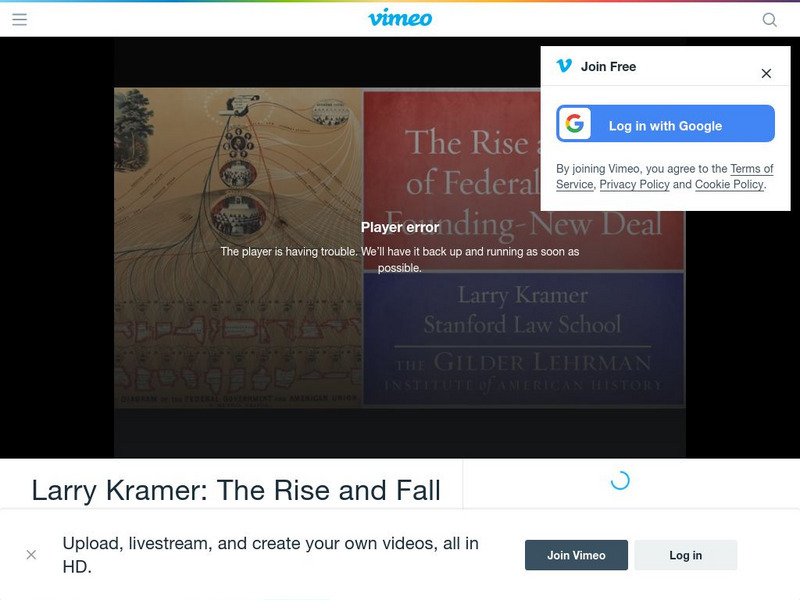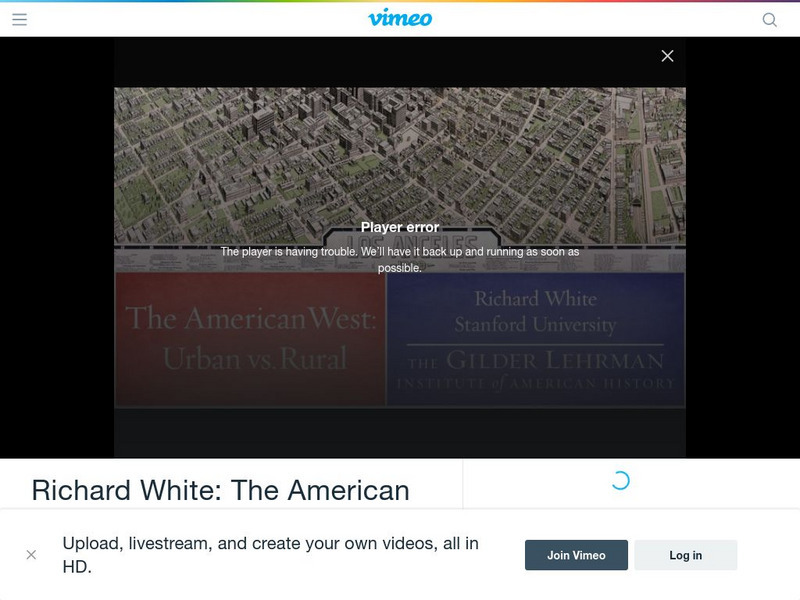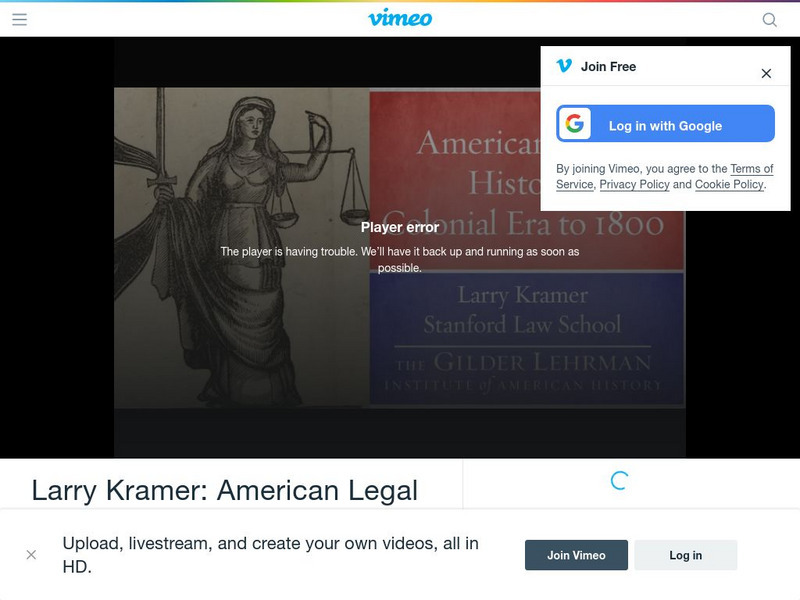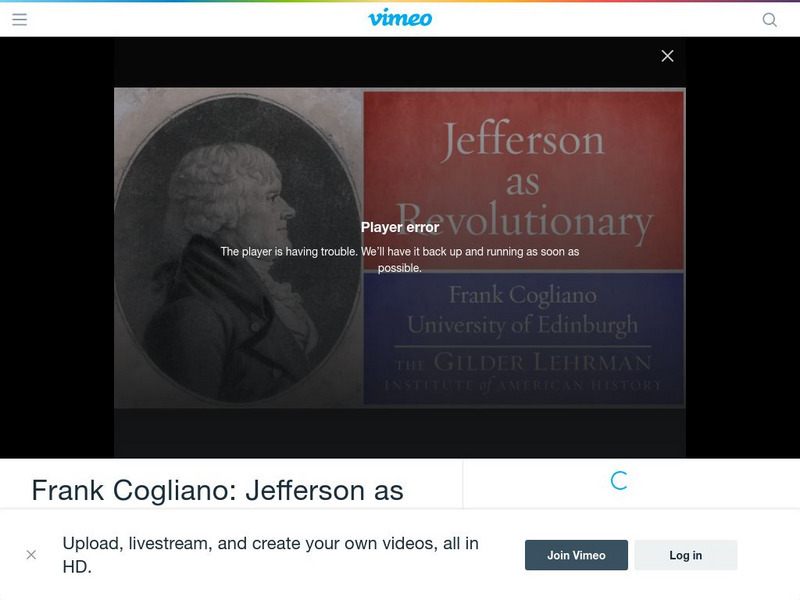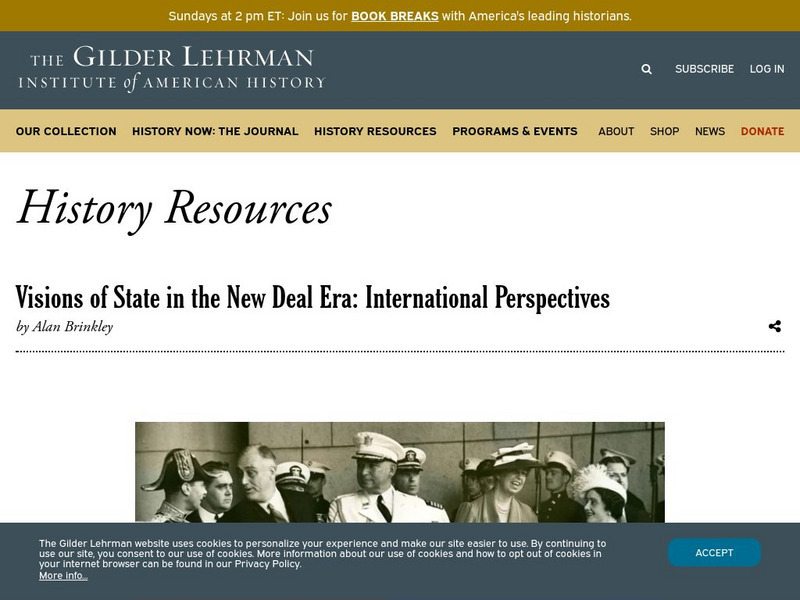Hi, what do you want to do?
Gilder Lehrman Institute of American History
Gilder Lehrman Institute: How Was North America Settled Before European Colonization?
Professor Peter C. Mancall from the University of Southern California provides an explanation for how North America was settled before European Colonization. [1:47]
Gilder Lehrman Institute of American History
Gilder Lehrman Institute: Ap Us History Study Guide Introduction
This brief introduction provides an overview of the study guide for the AP U.S. History course on the Gilder Lehrman site. Videos in each section provide detailed tips on how to study for the exam. [2:15]
Gilder Lehrman Institute of American History
Gilder Lehrman Institute: Political and Social Legacies of the Sixties
Ohio Wesleyan University Professor Michael Flamm discusses the political, social, and international legacies of the tumultuous 1960s and how they still influence society today. [52:16]
Gilder Lehrman Institute of American History
Gilder Lehrman Institute: Economic and Financial Crises in American History
What kicked off the major economic and financial crisis in the United States? Richard Sylla delivers a comprehensive presentation in an effort to educate views on the cause and effect of these breaking points throughout history. [1:29:20]
Gilder Lehrman Institute of American History
Gilder Lehrman Institute: Pursuit of Equity: Women, Men, Economic Citizenship
"In Pursuit of Equity: Women, Men, and the Quest for Economic Citizenship in 20th-Century America," is delivered by Alice Kessler-Harris. A detail heavy presentation differentiating between equality and equity and what that does within...
Gilder Lehrman Institute of American History
Gilder Lehrman Institute: The Rise and Fall of Federal Power
Larry Kramer, Dean at Stanford Law School, traces the rise and fall of federal power during the first 150 years of the nation's existence. [41:48]
Gilder Lehrman Institute of American History
Gilder Lehrman Institute: The Us, the Middle East, and the Cold War
Professor Malcolm Byrne of George Washington University discusses the policies of the United States overseas, the balance between idealism and reality, and why those in the Middle East do not like Americans. Byrne explains the importance...
Gilder Lehrman Institute of American History
Gilder Lehrman Institute: Empire of Liberty: A History of the Early Republic
Gordon Wood, Professor Emeritus at Brown University, and the author of Empire of Liberty: A History of the Early Republic, 1789-1815, examines the post-Revolutionary generation and the tremendous changes that occurred during that period....
Gilder Lehrman Institute of American History
Gilder Lehrman Institute: Grand Expectations: The United States, 1945 1974
James T. Patterson of Brown University, discusses how the major political, cultural, and economic events of the mid-20th century impacted America from 1945 through Watergate. [39:55]
Gilder Lehrman Institute of American History
Gilder Lehrman Institute: Introduction to Supreme Court Controversies Throughout History
Discover how the executive and legislative branches of government as well as the public have reacted to Supreme Court decisions. Larry Kramer, Dean at Stanford Law School, walks his audience through this complex history. [19:02]
Gilder Lehrman Institute of American History
Gilder Lehrman Institute: The Age of Homespun: Family Labor in the Colonial Economy
Laurel Thatcher Ulrich, of Harvard University, looks at cultural objects as documents to explain "the myth of homespun, a pastoral vision of America." [47:15]
Gilder Lehrman Institute of American History
Gilder Lehrman Institute: The American West: Urban v. Rural
Richard White, of Stanford University, discusses urbanization of the American West. [2:12]
Gilder Lehrman Institute of American History
Gilder Lehrman Institute: The Slaughterhouse Cases
The first major post-Civil-War Supreme Court decision, popularly know as the Slaughterhouse Cases, resulted in a pivotal interpretation of the relatively new Fourteenth Amendment. Larry Kramer, Dean at Stanford Law School, discusses why...
Gilder Lehrman Institute of American History
Gilder Lehrman Institute: American Legal History: Colonial Era to 1800
A presentation by Larry Kramer detailing the development of constitutional law, common law, rights and the judicial system of the new government in the just independent United States. Understand and identify the meanings of how the...
Gilder Lehrman Institute of American History
Gilder Lehrman Institute: Blind Memorandum: Abraham Lincoln and Leadership
A unique document written by President Lincoln in anticipation of the election of 1864 is introduced by history professor Matthew Pinseker. [7:44]
Gilder Lehrman Institute of American History
Gilder Lehrman Institute: His Excellency George Washington
Listen to a lecture given by Joseph J. Ellis, of Mount Holyoke College, highlighting his book, His Excellency George Washington, examining why the Founding Fathers seemed to always defer to George Washington, which is why he eventually...
Gilder Lehrman Institute of American History
Gilder Lehrman Institute: Jefferson as Revolutionary
Frank Cogliano, of the University of Edinburgh, delivers a lecture addressing Thomas Jefferson as a revolutionary. Coglliano initiates the discussion with the death of Jefferson. Find out why! [36:58]
Gilder Lehrman Institute of American History
Gilder Lehrman Institute: Separation of Powers and the Supreme Court
Presenters Jack Rakove and Sandra Day O'Connor discuss the creation of the judicial system in this video. The Founding Fathers collaborated at the Constitutional Convention to ensure that the rights of citizens would be protected by the...
Gilder Lehrman Institute of American History
Gilder Lehrman Institute: Taxation and Representation
"Taxation and Representation: The Imperial Debate between Britain and the Americans," presented by Gordon Wood, is focused on the United States around the time of the Boston Tea Party. The public in the U.S. wanted to be represented in...
Gilder Lehrman Institute of American History
Gilder Lehrman Institute: History Now: The Idea of America: Reflections on Birth of the u.s.
[Free Registration/Login Required] An interview conducted with Pulitzer Prize winner, Gordon S. Wood, author of "The Idea of America: Reflections on the Birth of the United States" about the book. What does it mean to be American? Wood...
Gilder Lehrman Institute of American History
Gilder Lehrman Institute: History Now: The Rise and Fall of the American Whig Party
[Free Registration/Login Required] Author and professor, Michael F. Holt, presents an overview of his book, "The Rise and Fall of the American Whig Party." This party lasted roughly twenty years in the United States, but in some way it...
Gilder Lehrman Institute of American History
Gilder Lehrman Institute: History Now: The Frontier, Railroads, and Mining
[Free Registration/Login Required] The Emergence of the Frontier, the Expansion of Railroads, and Mining is a round table discussion of groups who have reviewed documents, letters, etc. from movement west to either mine or acquire land,...
Gilder Lehrman Institute of American History
Gilder Lehrman Institute: History Now: Visions of State in New Deal: International
[Free Registration/Login Required] Alan Brinkley addresses the ways the New Deal development drew on experiences in other nations, particularly in the blurred areas between fascism, liberal democracy, and communism. [01:13:06]
Gilder Lehrman Institute of American History
Gilder Lehrman Institute: History Now: The March on Washington: A Virtual Tour
[Free Registration/Login Required] Stanford University professor Clayborne Carson shares his experience at the March on Washington, his first trip to the national capital in August, 1963. Carson takes viewers on a virtual tour of the...










